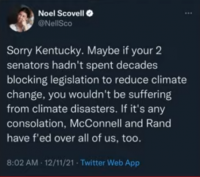Franklin Pierce
Well-Known Member
- Joined
- May 4, 2014
- Messages
- 29,345
- Likes
- 33,283
When the Unstoppable Activists Met Their Match
Six months ago, the Sunrise Movement was feeling bullish. The four-year-old youth climate organization had catapulted a massive legislative blueprint, the Green New Deal, to the forefront of Democratic politics. It helped elect progressives in the House and Senate in 2018 and 2020. It even successfully nudged President Joe Biden to put one of its allies in his Cabinet. Its leaders were starting to talk about how 2021 could be “Year 1” of a transformational decade of climate-driven politics in America.
They had reasons for optimism. The Democratic Party had just gained control of both Congress and the White House, and the once-controversial Green New Deal was polling well among voters. In the four years since Sunrise publicly launched in mid-2017, it had grown from a handful of former student activists to a full-fledged advocacy organization with a paid staff of more than 100 people, millions of dollars between its 501(c)3, 501(c)4 and PAC, and thousands of regular volunteers across the country.
“We’re kind of at the strongest that we have ever been,” Sunrise co-founder and executive director Varshini Prakash, who is 28, told Politico Magazine in May. “We’re doing more rallies and demonstrations and actions.”
Six months later, however, “more rallies and demonstrations and actions” doesn’t have quite the same shine as it used to. As Congress started negotiating a big infrastructure spending bill this summer and fall, set against a backdrop of record-level heat waves and deadly floods, Sunrise increasingly turned up the dial on its activism — hoping to push for multitrillion-dollar green investments. Over the past two weeks, for example, five Sunrise members went on hunger strike outside the White House, hoping to force Biden to fight for them at the negotiating table. Yet it’s becoming clearer that the organization’s core political promise — that it could harness youthful energy and idealism to deliver true big-ticket change — will remain unrealized. The more than $500 billion in climate investment Congress is currently considering is only a fraction of what Sunrise was calling for. More broadly, the prospects of the U.S. adopting any truly radical policies to cut carbon emissions — the kind of thing many scientists say is necessary to avert climate catastrophe — have never looked slimmer.
Six months ago, the Sunrise Movement was feeling bullish. The four-year-old youth climate organization had catapulted a massive legislative blueprint, the Green New Deal, to the forefront of Democratic politics. It helped elect progressives in the House and Senate in 2018 and 2020. It even successfully nudged President Joe Biden to put one of its allies in his Cabinet. Its leaders were starting to talk about how 2021 could be “Year 1” of a transformational decade of climate-driven politics in America.
They had reasons for optimism. The Democratic Party had just gained control of both Congress and the White House, and the once-controversial Green New Deal was polling well among voters. In the four years since Sunrise publicly launched in mid-2017, it had grown from a handful of former student activists to a full-fledged advocacy organization with a paid staff of more than 100 people, millions of dollars between its 501(c)3, 501(c)4 and PAC, and thousands of regular volunteers across the country.
“We’re kind of at the strongest that we have ever been,” Sunrise co-founder and executive director Varshini Prakash, who is 28, told Politico Magazine in May. “We’re doing more rallies and demonstrations and actions.”
Six months later, however, “more rallies and demonstrations and actions” doesn’t have quite the same shine as it used to. As Congress started negotiating a big infrastructure spending bill this summer and fall, set against a backdrop of record-level heat waves and deadly floods, Sunrise increasingly turned up the dial on its activism — hoping to push for multitrillion-dollar green investments. Over the past two weeks, for example, five Sunrise members went on hunger strike outside the White House, hoping to force Biden to fight for them at the negotiating table. Yet it’s becoming clearer that the organization’s core political promise — that it could harness youthful energy and idealism to deliver true big-ticket change — will remain unrealized. The more than $500 billion in climate investment Congress is currently considering is only a fraction of what Sunrise was calling for. More broadly, the prospects of the U.S. adopting any truly radical policies to cut carbon emissions — the kind of thing many scientists say is necessary to avert climate catastrophe — have never looked slimmer.






